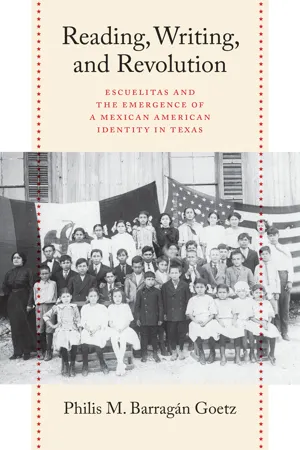
Reading, Writing, and Revolution
Escuelitas and the Emergence of a Mexican American Identity in Texas
- English
- ePUB (mobile friendly)
- Available on iOS & Android
Reading, Writing, and Revolution
Escuelitas and the Emergence of a Mexican American Identity in Texas
About This Book
2022 National Association for Chicana and Chicano Studies Book Award
Tejas Foco Non-fiction Book Award, National Association for Chicana and Chicano Studies
2021 Tejano Book Prize, Tejano Genealogy Society of Austin
2021 Jim Parish Award for Documentation and Publication of Local and Regional History, Webb County Heritage Foundation
2021 Runner-up, Ramirez Family Award for Most Significant Scholarly Book
The first book on the history of escuelitas, Reading, Writing, and Revolution examines the integral role these grassroots community schools played in shaping Mexican American identity. Language has long functioned as a signifier of power in the United States. In Texas, as elsewhere in the Southwest, ethnic Mexicans' relationship to education—including their enrollment in the Spanish-language community schools called escuelitas—served as a vehicle to negotiate that power. Situating the history of escuelitas within the contexts of modernization, progressivism, public education, the Mexican Revolution, and immigration, Reading, Writing, and Revolution traces how the proliferation and decline of these community schools helped shape Mexican American identity.
Philis M. Barragán Goetz argues that the history of escuelitas is not only a story of resistance in the face of Anglo hegemony but also a complex and nuanced chronicle of ethnic Mexican cultural negotiation. She shows how escuelitas emerged and thrived to meet a diverse set of unfulfilled needs, then dwindled as later generations of Mexican Americans campaigned for educational integration. Drawing on extensive archival, genealogical, and oral history research, Barragán Goetz unravels a forgotten narrative at the crossroads of language and education as well as race and identity.
Frequently asked questions
Information
Table of contents
- Cover
- Title Page
- Copyright
- Dedication
- Contents
- Introduction. Escuelitas, Literacy, and Imaginary Dual Citizenship
- Chapter 1. Escuelitas and the Expansion of the Texas Public School System, 1865–1910
- Chapter 2. Imaginary Citizens and the Limits of the Treaty of Guadalupe Hidalgo: Educational Exclusion and the Mexican Consulate Investigation of 1910
- Chapter 3. Revolutionary and Refined: Feminism, Early Childhood Education, and the Mexican Consulate in Laredo, Texas, 1910–1920
- Chapter 4. Education in Post–Mexican Revolution Texas, 1920–1950
- Chapter 5. Escuelitas and the Mexican American Generation’s Campaign for Educational Integration
- Conclusion. The Contested Legacy of Escuelitas in American Culture
- Acknowledgments
- Notes
- Bibliography
- Index